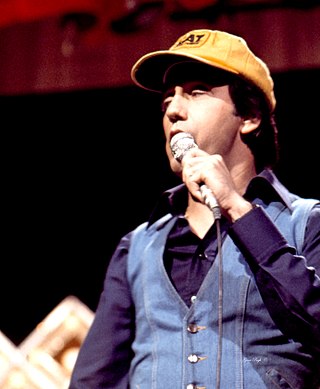
Harold Ray Ragsdale, known professionally as Ray Stevens, is an American country and pop singer-songwriter and comedian, known for his Grammy-winning recordings "Everything Is Beautiful" and "Misty", as well as novelty hits such as "Gitarzan" and "The Streak". Stevens has received gold albums for his music sales and has worked as a producer, music arranger, and television host. He is also an inductee of the Nashville Songwriters Hall of Fame, the Georgia Music Hall of Fame, the Christian Music Hall of Fame, and the Country Music Hall of Fame and Museum.

1,837 Seconds of Humor is the debut album of Ray Stevens, released in 1962. The front of the album shows a sheik that rides a camel, which is a reference to Stevens' song "Ahab the Arab." All of the material on the album was written by Ray Stevens and published by Lowery Music Co., Inc. (BMI). The back of the album cover contains an essay of biographical information of Stevens from his youth in his hometown of Clarkdale, Georgia to the time of this album's release and gives brief descriptions of all the songs on the album. Four singles were lifted from the album: "Jeremiah Peabody's Poly Unsaturated Quick Dissolving Fast Acting Pleasant Tasting Green and Purple Pills", "Scratch My Back ", "Ahab the Arab", and "Further More."
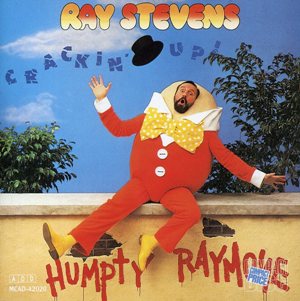
Crackin' Up! was Ray Stevens' twenty-fourth studio album and his fourth for MCA Records, released in 1987. Three singles were lifted from the album: "Would Jesus Wear a Rolex", "Three-Legged Man" and "Sex Symbols", the last two of which did not chart.
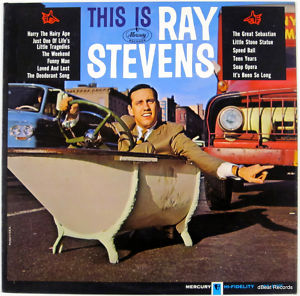
This Is Ray Stevens is the second album by Ray Stevens. It was released in 1963 by Mercury Records on the catalog numbers of MG 20828 and MG 60828. Like Stevens' previous album, 1,837 Seconds of Humor, all of the songs were written by Ray Stevens and published by Lowery Music Company, Inc. (BMI). The differences between both albums is that Stevens makes an attempt to prove his artistic versatility on this album by including six comical novelty songs and six ballads of serious music.

He Thinks He's Ray Stevens was Ray Stevens' twenty-first studio album and his first for MCA Records, released in 1984. The front of the album cover shows Stevens spoofing French emperor Napoleon Bonaparte. It was recorded in an effort to reestablish Stevens as a comic singer after a period in the early 1980s when he had focused mainly on serious material.

Beside Myself was Ray Stevens' twenty-sixth studio album and his sixth for MCA Records, released in 1989. It includes the singles "I Saw Elvis in a UFO" and "There's a Star Spangled Banner." The album was also his last for MCA Records before he moved to Curb Records for his next studio album, 1990's Lend Me Your Ears.
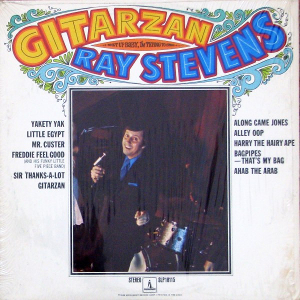
Gitarzan was Ray Stevens' fourth studio album, released in 1969, as well as his second for Monument Records. Unlike his previous album, Even Stevens, this album is completely in the genres of novelty and comedy. Although this is a true studio album, all of the songs are overdubbed with cheering and applauding of an audience to provide the feeling of a live album. Contents include three of the Coasters' hits, "Mr. Custer," and "Alley Oop." The album also contains re-recordings of his two novelty hits, "Harry the Hairy Ape" and "Ahab the Arab." "Freddie Feelgood " makes its first appearance on an album but is overdubbed with audience noises for this album.

Everything Is Beautiful was Ray Stevens' sixth studio album, released in 1970, as well as his first for Barnaby Records. After making regular appearances on The Andy Williams Show during the show's eleventh season, Stevens left Monument Records in early 1970 and signed with Barnaby . The album was rush-released to capitalize on the success of the single of the same name, which was the album's sole single. Cover versions include "Get Together," "Raindrops Keep Fallin' on My Head," John Denver's hit "Leaving on a Jet Plane," "A Time for Us," Bob Dylan's song "She Belongs to Me," and two of the Beatles' songs.

Boogity Boogity was Ray Stevens' eleventh studio album, released in 1974, as well as his sixth for Barnaby Records. For this album, Stevens returns to the genres of novelty and comedy. The album was released to capitalize on the success of his hit single "The Streak", which was inspired by the fad of streaking during that time period. Stevens' two songs, "Freddie Feelgood " and "Bagpipes That's My Bag," were taken from his album Gitarzan and were reissued on this album. The front of the album cover shows Stevens running in a blur, seemingly in the nude, and also contains the phrases "Woosh!!" and "Don't look Ethel!" the latter of which is part of the lyrics to the primary single of the album.

Ray Stevens' Greatest Hits is a collection of songs that Ray Stevens previously recorded for Barnaby and Monument Records from 1968 to 1971. This marks the first album appearance of Stevens' novelty hit single "Bridget the Midget ." This collection contains two more singles from Barnaby while the rest are recordings for Monument. "Gitarzan" is the album version that begins with noises of an audience. "Harry the Hairy Ape" and "Ahab the Arab" are not the original recordings but re-recordings that were made for Monument. "Mr. Businessman" is the album version.

Misty was Ray Stevens' twelfth studio album as well as being his seventh and final for Barnaby Records. It was released in 1975. This album contains primarily cover versions of various songs that were popular from the 1920s to the 1950s, though there are two original songs for the album as well. Four singles were lifted from the album: the title track, "Indian Love Call," "Young Love," and "Lady of Spain".

His All-Time Greatest Comic Hits is a 10-track collection of previously recorded songs by Ray Stevens, released in 1990 by Curb Records. One of the qualities that makes this collection identifiable is that it concentrates solely on Stevens' songs of novelty and comedy. However, the versions of certain songs on this compilation are not original recordings or the most popular versions; the version of "Gitarzan" is the album version that begins with cheering and applauding of an audience; "Ahab, the Arab" is a re-recording that Stevens made for his album Gitarzan; "Freddie Feelgood" is the album version from Gitarzan that contains audience noises.

The Very Best of Ray Stevens is a collection of 12 previously released singles that were hits for novelty/country artist, Ray Stevens; it was released in December 1975 by Barnaby Records. While this collection has more emphasis on Stevens' hits for Barnaby, it also contains three from the label of Monument Records and two from Mercury Records. The version of "Mr. Businessman" is the single release. "Gitarzan" is the album version that begins with an audience cheering and applauding. "Ahab the Arab" is the original recording that was released by Mercury.
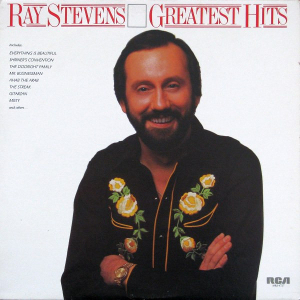
Greatest Hits is a collection of ten previously released singles by Ray Stevens, released in 1983 by RCA Records. This collection contains three singles that were released by Monument Records, four by Barnaby Records, and two by RCA. One of the selections is not an original recording; "Ahab the Arab" is a re-recording of Stevens' 1962 hit for Mercury Records that was included on his album Gitarzan, which was released by Monument in 1969. Additionally, there are two selections featured on this collection that are album versions; "Gitarzan" is the album version that begins with cheering and applauding with an audience; "Freddie Feelgood" is the version that contains audience noises and was first featured on the album Gitarzan.

All-Time Greatest Hits is a collection of 23 songs that were previously recorded by Ray Stevens, released in 2001. Like many collections of Stevens' music, it concentrates 99% on recordings that were made for the record labels of Monument and Barnaby. The one exception is the first track, "Sergeant Preston of the Yukon," an unsuccessful hit that was released in 1960 by the NRC label. "Sergeant Preston of the Yukon" makes its first album appearance on this collection. The rest of the selections were recorded between the years of 1966 to 1975.
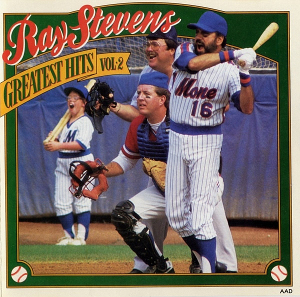
Greatest Hits, Vol. 2 is a collection of ten previously released singles by Ray Stevens, released in 1987. It is the second volume of the Greatest Hits package of Stevens' music that was released by MCA Records. Of the ten selections on this volume, the fifth track, "Mama's in the Sky With Elvis," makes its first album appearance. Additionally, this collection consists of five recordings for MCA Records, two for Warner Bros. Records, two for Monument Records and one for Mercury Records.

I Never Made a Record I Didn't Like is Ray Stevens' twenty-fifth studio album and his fifth for MCA Records, released in 1988. Two singles were lifted from the album: "Surfin' U.S.S.R." and "The Day I Tried to Teach Charlene Mackenzie How to Drive." The "Surfin' U.S.S.R." single was accompanied with a music video. The song blends the sound of the Beach Boys with the real world events of the Soviet Union. The second single tells the story of how Stevens attempts to teach a deaf woman how to drive. The character would play an important role several years later when Stevens filmed his direct-to-home video movie, Get Serious!. Connie Freeman portrayed Charlene Mackenzie in the movie.
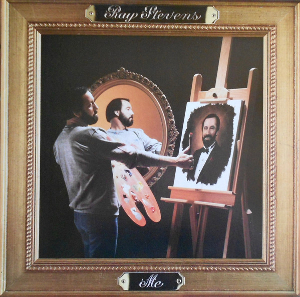
Me was Ray Stevens' twentieth studio album and his third and final for Mercury Records, released in 1983. In 1982, Stevens returned briefly to Mercury to record this album before moving to MCA Records in 1984. The front of the album cover shows Stevens portraying a painter painting a self-portrait; while the back shows the finished portrait on a table along with a second self-portrait that is sketched by pencil, a cup filled with paint brushes, the paint tray, tubes of paint, a small glass filled with water and a rose, and a lamp. Two singles were lifted from the album: "Love Will Beat Your Brains Out" and "My Dad."

20 Comedy Hits is a collection of previously recorded songs by Ray Stevens, released in 1995. The first, third, fourth and fifth tracks were included through the courtesy of Barnaby Records, for whom Stevens recorded during the early seventies. The selection of "Shriner's Convention" is a live version that was taken from the album Ray Stevens Live! "Gitarzan" is the album version that begins with audience noises, and "Ahab the Arab" is a re-recording of his 1962 hit for his album Gitarzan. The remaining tracks are selections that were recorded for Curb Records; of these selections, only two were released as singles and the rest served as album cuts. The sixth to ninth tracks were taken from the album Classic Ray Stevens, the tenth to thirteenth tracks from #1 With a Bullet, and the last seven from Lend Me Your Ears. Overall, it is not completely accurate to include the word "hits" in the title of this compilation, as it contains only seven songs that were previously released as singles and five of the seven made true impact on the charts.
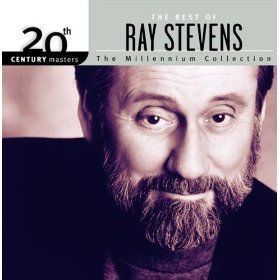
20th Century Masters – The Millennium Collection: The Best of Ray Stevens is a 12-track collection of previously recorded songs by Ray Stevens, released in 2004. It consists of the biggest hits he had from 1961 to 1987, starting with his breakthrough hit "Jeremiah Peabody's Polyunsaturated Quick-Dissolving Fast-Acting Pleasant-Tasting Green and Purple Pills" to his hit "Would Jesus Wear a Rolex". Unlike many compilations of Stevens' music, this collection contains the original recordings of "Ahab the Arab" and "Harry the Hairy Ape", which were re-recorded for Stevens' fourth studio album Gitarzan. The selections of "Freddie Feelgood", "Mr. Businessman" and "Gitarzan" are album versions, the first and third of which were featured on Gitarzan. Inside the album cover are information on the featured singles and a biographical essay written by Gene Sculatti back in December 2003. In the essay, Sculatti mistakenly says that Gitarzan is the one who shouts, "Shut up, baby! I'm tryin' to sing!" in the song "Gitarzan", as it is actually Jane who shouts this phrase.




















